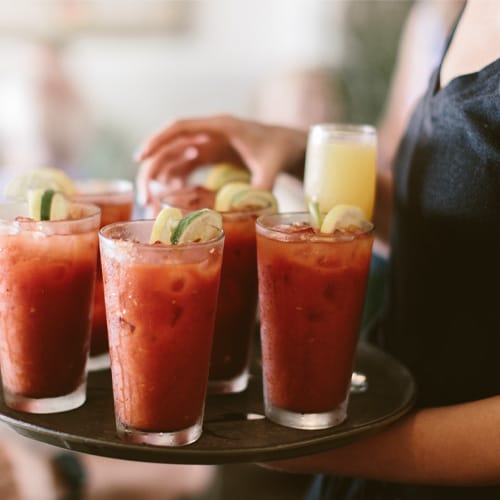
The role of a server in the food service industry is crucial to the success of any restaurant, catering company, or banquet hall. Servers play a vital part in producing a positive dining experience by providing excellent customer service, taking accurate orders, and delivering food and beverages promptly. A good server also contributes to the overall ambiance of the establishment by creating a welcoming and hospitable atmosphere for guests. When searching for a restaurant server to hire, constructing a strong job description that clearly outlines roles, requirements, and expectations is a great way to increase the likelihood a quality hire.
What Is a Server?
A server in the restaurant industry is a crucial member of the front-of-house staff responsible for taking orders, serving food and beverages, and providing excellent customer service. Servers are usually the primary point of contact between the restaurant and its guests. They try to guarantee that customers have an enjoyable dining experience from start to finish by utilizing a combination of strong communication skills, attention to detail, and a customer-focused mindset.
Server Duties and Responsibilities
As a server in the foodservice industry, your duties and responsibilities are crucial to the success of a restaurant or catering business. Servers are the front line of customer service, responsible for ensuring that guests have an enjoyable dining experience. Here are some key tasks that servers typically perform:
1. Greeting and Seating Guests
Upon arrival, servers must promptly greet guests, welcoming them to the restaurant and offering assistance as needed. This may involve providing information about the menu, specials, or any other relevant details that enhance the dining experience. Servers should also be attentive to guests' needs and preferences, such as seating preferences or special accommodations for large groups or individuals with specific requirements.
2. Taking Orders

This task involves more than simply jotting down a list of menu items. Servers must possess excellent communication skills to interact with guests effectively and ensure accurate order-taking. When taking orders, servers must pay close attention to specific customer requests, such as modifications to menu items or dietary restrictions. They must also be knowledgeable about the menu offerings, including ingredients and preparation methods, to answer any questions that customers may have.
3. Serving Food and Beverages
Servers are responsible for delivering orders accurately and promptly to guests' tables. This includes carrying trays of food and drinks and refilling customers' beverages. Also, servers should periodically check in with guests to confirm that they are satisfied with their meals and address any concerns or requests they may have.
4. Handling Payments
When customers are ready to settle their bills, servers must be prepared to calculate the total amount accurately, including any additional charges like taxes or gratuity. They should be knowledgeable about different payment methods and possess the skills to operate point-of-sale systems or cash registers effectively. Servers must also handle any discrepancies or issues that may arise during the payment process such as dealing with chargebacks or providing refunds.
5. Maintaining Cleanliness
Keeping the dining area clean and organized is an important aspect of a server's responsibilities. This includes clearing tables, resetting them for the next guests, and confirming that the dining area is presentable at all times. In addition to table cleanliness, servers are also tasked with keeping their workstations tidy and well-stocked. This involves restocking condiments, napkins, and other supplies as needed, as well as promptly removing any debris or clutter from the server station.
6. Collaborating with Kitchen Staff
Servers work closely with the kitchen team to ensure that orders are prepared accurately and delivered to customers promptly. Servers are responsible for accurately relaying customer orders to the kitchen, including any special requests or dietary restrictions. They must check that all items on an order are prepared correctly and that each dish meets the customer's specifications. Additionally, servers may need to communicate any changes or updates to orders to the kitchen staff promptly.
7. Upselling and Promoting Menu Items
Upselling involves suggesting additional items or upgrades to customers, such as appetizers, desserts, or premium beverages, to enhance their dining experience and increase the total check size. By showcasing knowledge of the menu and making personalized recommendations based on customer preferences, servers can successfully upsell items and drive revenue for the establishment.
8. Adhering to Health and Safety Standards
For servers, adhering to health and safety standards includes maintaining a clean and sanitized work environment to prevent contamination and the spread of illnesses. Servers must follow proper handwashing protocols, wear appropriate protective gear such as gloves, and handle food and beverages with care to prevent cross-contamination. In addition to personal hygiene practices, servers are also responsible for monitoring the temperature of food items to ensure they are stored and served at safe temperatures. They must also be knowledgeable about food safety regulations and procedures to handle food properly and prevent foodborne illnesses.
Server Skills and Qualifications

To excel in a server role, individuals must possess a unique set of skills and qualifications that contribute to providing exceptional service in the foodservice industry. By possessing these skills and qualifications, servers uphold the highest standards of service excellence and contribute to the overall success of a establishment.
- Excellent Communication Skills - Servers must have strong verbal communication skills to interact effectively with customers, understand their needs, and convey information accurately to kitchen staff and other team members.
- Customer Service Orientation - A customer-centric approach is crucial for servers to ensure that guests have a positive dining experience. This includes being attentive, friendly, and responsive to customer requests and feedback.
- Time Management - The ability to multitask, prioritize tasks, and work efficiently under pressure is essential for servers to handle busy shifts and guarantee timely service to customers.
- Problem-Solving Skills - Servers need to be quick on their feet and adaptable to handle unexpected situations, such as customer complaints, order mix-ups, or kitchen delays.
- Teamwork and Collaboration - Working effectively with kitchen staff, fellow servers, and other team members is crucial for maintaining a smooth operation and delivering seamless service to customers.
- Attention to Detail - Servers must pay close attention to customer orders, special requests, and dietary restrictions to guarantee accuracy and consistency in service delivery.
How to Write a Server Job Description

When it comes to hiring servers for your restaurant or foodservice establishment, crafting a comprehensive and detailed job description is crucial. A well-written server job description not only attracts top talent but also sets clear expectations for the role. Here are some key factors to consider when writing a server job description:
- Job Title and Summary - Begin by clearly stating the job title, such as "Server" or "Waiter/Waitress," followed by a brief summary of the role. This summary should provide an overview of the primary responsibilities and duties of the server position.
- Responsibilities - Outline the specific tasks and responsibilities that the server will be expected to perform. This may include taking orders, serving food and beverages, providing excellent customer service, and maintaining a clean and organized work environment.
- Requirements - Detail the qualifications and skills required for the position. This may include previous experience in a similar role, knowledge of food and beverage menus, excellent communication skills, and the ability to work effectively in a fast-paced environment.
- Physical Demands - Mention any physical requirements of the job, such as the ability to stand for long periods, lift heavy trays, and navigate a busy dining area.
- Work Environment - Describe the work environment in which the server will operate, including the type of establishment and any specific conditions or requirements like an employee dress code.
- Benefits and Perks - If applicable, highlight any benefits or perks that come with the position, such as flexible scheduling, employee discounts, or opportunities for advancement.
- Company Culture - Provide a brief overview of your establishment's values, mission, and culture to give potential candidates a sense of what it's like to work for your organization.
As a key player in the foodservice industry, servers play a crucial role in ensuring customer satisfaction and the smooth operation of a restaurant. Their responsibilities go beyond simply taking orders and delivering food; they are the face of the establishment, providing excellent customer service and enhancing the overall dining experience. By embodying consistent quality service, servers help create a memorable dining experience for customers and contribute to the long-term success of the restaurant.





